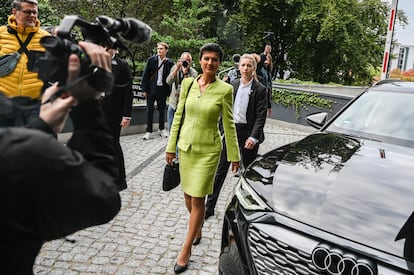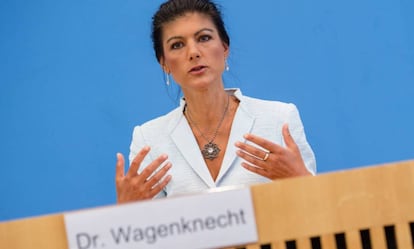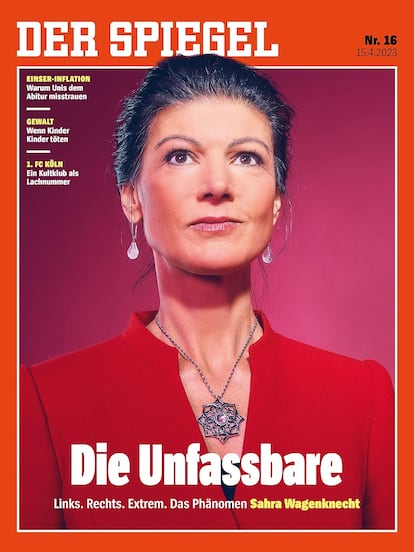Sahra Wagenknecht: The populist battering ram who has both the German left and right worried
The former leader of the Left Party has become the most interesting politician in Germany. She has formed a new party in defense of the workers, while copying some policies that resemble the far-right AfD, which is skyrocketing in the polls


The enigmatic air with which Sahra Wagenknecht has been presenting herself to the German people for decades has never been so justified. There are tons of questions these days about the left-wing leader and her new project: the founding of a party that threatens to sink the post-communists of the Left Party, while also stealing some votes from the far-right Alternative for Germany (AfD). Evidently, there’s a paradox afoot.
Perhaps the best-known East German (after Angela Merkel), the 54-year-old career politician is one of the most charismatic public officials in the country. At the same time, the member of the Bundestag is a complete mystery. What does she really believe in? And what will her new bloc — which has caused an earthquake in the German political landscape — be like?
At the moment, the early polls that ask the German voters about Wagenknecht’s party give her an average of 14% support. This is a strong result, which — if an election were held today — would catapult the newly-founded party to fourth place, only behind the Christian Democratic Union (CDU), the far-right AfD and hot on the heels of the social democrats from the ruling SPD. Meanwhile, two in ten Germans say they would consider throwing their support to BSW. The “BSW” stands for “Bündnis Sahra Wagenknecht,” or the Sahra Wagenknecht Alliance.
Since she publicly announced her departure from the Left Party — a party for which she had been a candidate for chancellor — and the creation of a new party, interviews have taken place that have left everyone confused. “Will your new party be left-wing or right-wing?” a Die Welt journalist asked her right away. “Are you going to create a left-wing AfD?” is also a common question.
What is known about Wagenknecht’s positions is that she’s pro-Russian — or, at least, on good terms with Moscow — anti-NATO and anti-immigration. A combo with which she wants to undertake the conquest of the German East.

She doesn’t want to define herself. In fact, the word “left” isn’t going to be part of the name of the party, as she noted, because the goal of the new bloc is to address the widest possible spectrum of potential voters. Wagenknecht wants to lead a party that has traditionally left-wing values, focused on the defense of workers and the redistribution of wealth. But she also wants to poach some support from the AfD’s voters, by rejecting woke values, calling for the end of sanctions on Russia and opting for a much more restrictive immigration policy.
Wagenknecht spent more than 10 years living in a village in Saarland, the small German state bordering France. Her husband, Oskar Lafontaine, was minister-president there for 13 years. The media highlights that the veteran politician and former minister — who also co-founded the Left Party after leaving the Social Democratic Party, due to disagreements with the leadership — has helped shape his wife’s political personality. In recent years, she appears more human and less robotic. For instance, her participation in a famous cooking show or her appearance dressed up as Princess Leia at a carnival were events that surprised (and pleased) the public.
Despite being the eternal rebel of the Left Party, she has acted as its representative in countless rallies and TV debates. Her strong performance and rising popularity made her the main asset of the third-place party. Her departure is going to be very difficult for the Left Party, because if her new party is successful, it means that it will have drawn from traditional left-wing voters. “It doesn’t look good for them,” affirms Uwe Jun, a political scientist at the University of Trier.
Wagenknecht started out very early in politics, as a member of leftist groups after the fall of the Berlin Wall. Raised in the German Democratic Republic (GDR), she lived with her grandparents for a time. Her father — an Iranian student opposed to the Sha — disappeared without a trace after returning to his country when she was two-years-old. Her biographer, Christian Schneider, explains that she had a rather lonely childhood, with few friends. She was teased for the color of her hair and her darker skin. She studied philosophy in East Berlin and is known for her solid intellectual training, having published several books. Her thesis dealt with a young Karl Marx’s interpretation of Hegel.
She’s been on the political frontlines for more than 30 years. In 1991 — at just 22-years-old — she was elected to the board of directors of the PDS, the Party of Democratic Socialism, which was the heir to the SED (the only party that was permitted in the GDR). When the Left Party was founded in 2007 — the result of the merger of the PDS with Lafontaine’s movement, who was disappointed with the social cuts made during Chancellor Gerhard Schröder’s SPD administration (1998-2005) — Wagenknecht also immediately found herself in prominent positions. In 2009, she became deputy leader of the parliamentary group. Quickly, everyone realized that she had an electoral pull. In 2017, the party designated her as its co-candidate for chancellor alongside Dietmar Bartsch. Together, they achieved the party’s best-ever result in the federal elections, garnering 9.2% of the votes.
Opposed to sanctions on Moscow and to an open-door refugee policy
Wagenknecht — who, in some circles, is referred to as “Putin’s puppet” — has been fundamentally deviating from the Left Party line for years, even since the refugee crisis of 2015. At that time, she was already criticizing Chancellor Merkel’s open-door refugee policy — something that her own party was supportive of. During the pandemic, she questioned vaccines and lockdowns. Discussions about gender also don’t interest her — she considers them to be marginal issues that receive too much public attention. And, since Russia launched its invasion of Ukraine, she has called for peace talks with Moscow and has criticized Olaf Scholz’s government for sending weapons and approving sanctions. She says that these policies harm the German economy.
How will she combine all these positions in a general election? The contradiction between her bourgeois appearance and her radical left opinions may be shocking, but now she has the even more difficult task of combining Marxist positions with anti-vaccine and conspiracy rhetoric, topped off with anti-immigration statements practically copied from the far-right AfD’s platform. Many analysts are asking if she’s truly left-wing.

Five years ago, Wagenknecht tried to build her own parallel organization to the Left Party, which she called Aufstehen (“Stand Up”). With this movement, she tried to rally disenchanted former left-wing voters who had migrated to the AfD. Her efforts were inspired by the French left-wing populist movement, La France Insoumise (“France Unbowed”) of Jean-Luc Mélenchon, whom she considers to be a role model. But it didn’t work out. After just six months, she abandoned the project. By then, the relationship with the Left Party was already unsustainable, and several militants began a process to expel her. But as they didn’t succeed, she continued to publicly criticize the party that she was a part of. She says that the German left has distanced itself from the very people it is supposed to defend: “normal workers and retirees.”
More recently, this past February, Wagenknecht called for a “March for Peace,” to demand an end to the policy of arming Ukraine and to begin seeking diplomatic solutions to the conflict unleashed by Moscow. Alongside activist Alice Schwarzer — an icon of German feminism — she managed to gather around 10,000 people on a freezing day near the Brandenburg Gate. The warnings from across the entire German parliamentary spectrum about the possible infiltration of right-wing and left-wing radicals and that the rally would be instrumentalized by the Kremlin went unheeded. Two weeks before the march, the two organizers published a manifesto that accused Chancellor Scholz of promoting an escalation of war by providing the government in Kyiv with military aid.
Will Wagenknecht manage to benefit from the growing polarization of German society this time around? Will she benefit from the lack of popularity of Olaf Scholz’s coalition? The first test is set to take place just over half-a-year from now, with the next European elections. However, the definitive test will occur during the state elections in Saxony, Brandenburg and Thuringia, places where populist discourse is taking hold.
Sign up for our weekly newsletter to get more English-language news coverage from EL PAÍS USA Edition
Tu suscripción se está usando en otro dispositivo
¿Quieres añadir otro usuario a tu suscripción?
Si continúas leyendo en este dispositivo, no se podrá leer en el otro.
FlechaTu suscripción se está usando en otro dispositivo y solo puedes acceder a EL PAÍS desde un dispositivo a la vez.
Si quieres compartir tu cuenta, cambia tu suscripción a la modalidad Premium, así podrás añadir otro usuario. Cada uno accederá con su propia cuenta de email, lo que os permitirá personalizar vuestra experiencia en EL PAÍS.
¿Tienes una suscripción de empresa? Accede aquí para contratar más cuentas.
En el caso de no saber quién está usando tu cuenta, te recomendamos cambiar tu contraseña aquí.
Si decides continuar compartiendo tu cuenta, este mensaje se mostrará en tu dispositivo y en el de la otra persona que está usando tu cuenta de forma indefinida, afectando a tu experiencia de lectura. Puedes consultar aquí los términos y condiciones de la suscripción digital.








































